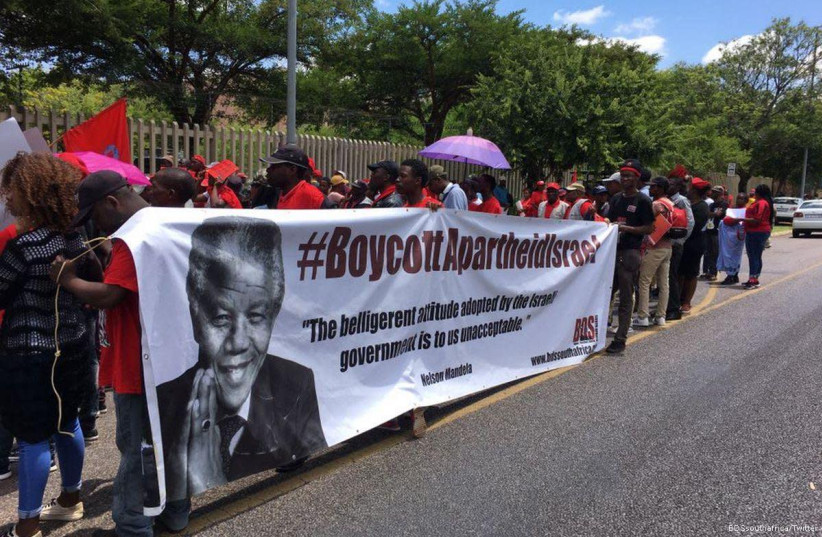The American Friends Service Committee has been at the forefront of the Israel boycott movement for decades. Nothing, including the terrible Hamas massacre of October 7, has changed their stance.
In a recent interview, the current head of the AFSC, Joyce Ajlouny, gave a long diatribe about her recent visit to the region and to share her post-October 7 narrative. Prior to becoming the committee’s director, she served for 13 years as director of the Ramallah Friends School, a hotbed of Arab nationalism and opposition to Zionism. The Ramallah School has also become a feeder to Quaker schools in the US, especially in Pennsylvania.
It was no surprise that Ajlouny’s story was filled with Holocaust inversion, slogans accusing Israel of apartheid and genocide, and highlighting her work with the “good Jews” from Jewish Voices for Peace (JVP) and IfNotNow (INN).
Above all, her narrative minimized the events of October 7 but with a sense of schadenfreude, deflecting all facts regarding the barbaric Hamas attack and Israel’s response with attempts to rationalize the terrorist group’s behavior as being justified by the nakba (catastrophe of 1948) and the “occupation.”
“I think people don’t understand that this is not an Oct. 7 start date for this occupation and this apartheid system,” she said. “I’ve lived through it all my life as a child. Where do I begin to explain the ins and outs of what it means to be under the military control of a belligerent, settler-colonial system that wants to ethnically cleanse me from the land? I believe that that is what’s happening. It’s really about that. It’s a continuation of that.”
The root cause, in Ajlouny’s view, is Israel, which got what it deserved on October 7.

THE AFSC has long used Quaker pacifism as a fig leaf, as it transformed itself into a full-fledged advocate for the Palestinian cause at the helm of the boycott movement against Israel. Palestinianism forms a central pillar of Quakerism today, as well as for a broad swath of American Jews unwittingly influenced by 20th century Reform leader Judah Magnes’ unique Quakerly Judaism. Palestinians have acquired a curiously sanctified place, and their violence is tolerated, explained and even justified by pacifists.
A history of Quaker anti-Israelism, antisemitism
Historically, with the rise of Nazism, the committee became involved with what would become the greatest refugee crisis in history. That experience demonstrated the organization’s approach to religious diplomacy and relief efforts, where naïve idealism coexisted with practicality.
For example, during the 1930s, the Friends network in Germany, including Quaker Student Clubs, gave the AFSC in Philadelphia an unusually clear view of the nature of the regime and the growing persecution of Jews. Shortly after Kristallnacht in November 1938, committee co-founder Rufus Jones and two other leading Quakers traveled to Germany to personally investigate the suffering of the Jews.
There they pled the case with representatives of the Reich Security Main Office and Reichsführer-SS Reinhard Heydrich for Quakers to be permitted to investigate the condition of Jews and bring relief aid. In a written statement, Jones stressed that they had aided Germans in the past, were completely non-political and non-judgmental, and had only come “to support and save life and suffer with those who are suffering.” The AFSC’s understanding of Hamas’ contemporary evil is even less useful.
Quaker attitudes towards Jews during the mid-1940s, ostensibly supportive, were in fact abstract and bordered on antisemitic. The organization took a leading role in providing aid to Arab refugees in Gaza after 1948.
But the lack of “Quakerly values” among Israelis with whom they interacted on a political basis, or their own employees like future professor Don Peretz, deemed “too Zionist” (in addition to being Jewish), reflects an almost theological confrontation between abstract beliefs and expectations and complex realities. Peretz’s troubled relationship with the AFSC underscores the organization’s abandonment of pacifism; even left-wing Jews like Peretz – a conscientious objector during World War II – were not “Quakerly” enough given their Jewishness.
TODAY, the AFSC has gone even further by embracing BDS and will only deal with far Left Jews like those in the Jewish Voice for Peace who call for the end of the Zionist enterprise. So strong is JVP’s antipathy to Israel that even the Anti-Defamation League (ADL) has called it “the largest and most influential Jewish anti-Zionist group” in the US.
Notwithstanding all the evidence of barbarism, savagery and sexual abuse on October 7, Ajlouny and the group she heads regard their support for the BDS movement and the Palestinian narrative as just and righteous. As the committee puts it, its advocacy of BDS is “contextualized by Quakers and AFSC’s long support for boycotts, divestment and sanctions as economic tactics that appeal to human conscience and change behavior,” thereby situating its campaigns against Israel alongside its opposition to slavery, segregation, apartheid and other reprehensible phenomena.
In doing so, however, the AFSC aligns itself with Hamas, accepting and justifying violence even as it touts “nonviolent efforts to realize peace and justice in Israel and Palestine.” Ajlouny says that what “people don’t realize is... the day-in-and-out of our lives, the daily humiliation that I remember as a child, and as leading a school there, seeing how brutal the occupation is. And the trauma, the collective trauma that has caused for generations.”
All of the above highlights the contradictions and brings the AFSC closer to full-fledged endorsement of Hamas. However tragic that would be, it would have the advantage of honesty.
The writer is the executive director of Scholars for Peace in the Middle East (SPME) and the Association for the Study of the Middle East and Africa (ASMEA).
